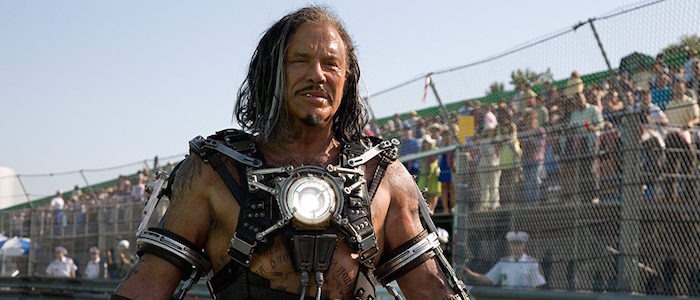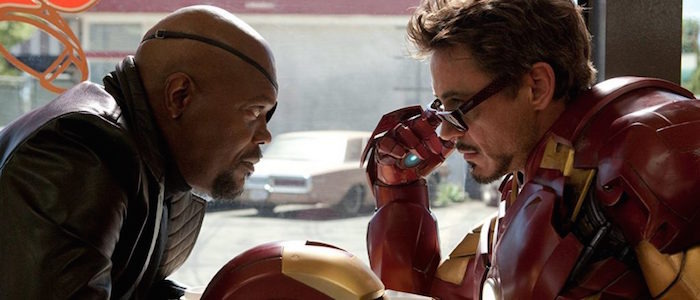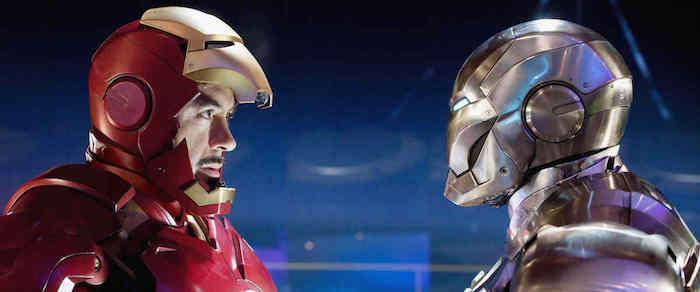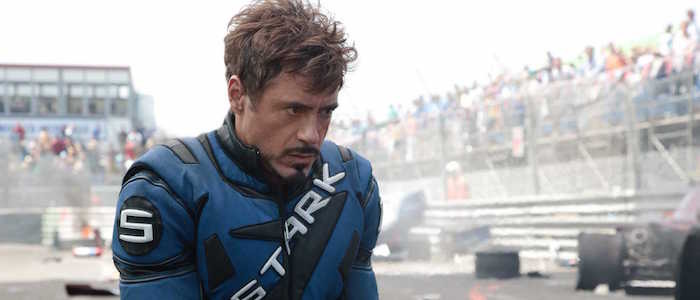'Iron Man 2' Was Marvel's First Major Misfire, But One That Planted Seeds For Future Success
(Welcome to Road to Infinity War, a new series where we revisit the first 18 movies of the Marvel Cinematic Universe and ask "How did we get here?" In this edition: Marvel misfires on every cylinder with Iron Man 2.)
In the seasonal game that is ranking the Marvel movies, most folks would place the franchise's first proper sequel near the bottom of their lists. However, at the time of its release in 2010, the film found itself sitting atop a lofty pile of over $620 million, with three out of every four reviews on Rotten Tomatoes coming in at some degree of positive. At the time, a lot of people liked Iron Man 2 just fine.
Upon re-watch, it's fine in the most middle-of-the-road, passive-watch sense of the word. "Fine" is the descriptor that feels most apt, given that the film has neither the novel spark of its predecessor nor features the emotional heights that Marvel's future films would eventually reach, but it also doesn't have enough going on by way of narrative risks to drop the ball hard enough. Is that worse than a film that shoots for the moon but lands among the dirt? Arguably, though average is still average at worst. Even as a feat of world-building, it does little to expand on what came before it in both Iron Man and The Incredible Hulk, but it remains at the very least a showcase for why the Marvel formula works even when it misses the mark.
If this is the worst the MCU has to offer – and it very likely is – then Marvel Studios has been doing just fine for quite some time. But it's worth examining why exactly it failed to live up to its predecessor, and how that failure set the stage for Marvel's future successes.
Two Steps Back Politically
While the first Iron Man stopped just short of getting to the heart of America's military industrial complex, it presented a coherent enough worldview to stand apart from the pre-Dark Knight blockbuster climate of 2008. Iron Man 2 on the other hand, finds itself divorced from anything resembling our political reality right from the get-go. It's during the film's prologue that we witness a brief newspaper snipped with the headline "Iron Man Stabilizes East-West Relations," before Tony Stark shows up at his eponymous Expo (see: eXpo) to introduce us to the series' new backdrop. He calls the preceding six months the longest period of uninterrupted peace the world has ever seen, which apart from feeling like a lazy and wrongheaded narrative assertion, is also in direct clash with the plot of the film, not to mention its character-centric story.
The tale is set into motion when U.S. Government subpoenas Tony Stark to appear in front of an arms committee. Well, no, it's set into motion when Ivan Vanko (Mickey Rourke), the son of a man wronged by Tony's father Howard, crashes Tony's Grand Prix stint. Either way, we may as well be dealing with two separate films at first – and by the end, for that matter.
As for the committee scene, while it establishes Stark's relationship to his creation ("I am Iron Man. The suit and I are one."), much of it is spent trying to re-establish the specifics of this so-called world at peace, a supposed global armistice brought about by one man. At the hearing, not only are we introduced to private weapons manufacturer Justin Hammer (Sam Rockwell, doing his best to breathe life into a confused piece), we're also given glimpses into the failing although most certainly active military R&D of nations like North Korea and Iran and their attempts to create their own Iron Men. Per the video footage seen in the film, footage displayed by Stark himself no less, this is far from a world at peace regardless of how many times Stark asserts himself to be a "nuclear deterrent." This is, at best, a world locked in a global Cold War.
The plot from there on out involves Hammer recruiting Vanko to create Iron Man-esque suits (and later, drones) for the U.S. military. It's a direct and, one would think, logical continuation of the first film's focus on private arms manufacture, though the sequel seems far more intent on having Stark talk about how he "privatized world peace" without ever being challenged on it. In effect, despite the words coming out of the characters' mouths, the world is exactly as it was six months prior – we're never shown or told anything Stark has actually done to change it – and the only tangible difference is a single suit of armour.
Even as the plot revolves around the military trying to seize this armour, the world keeps on spinning as usual. Even the U.S. military already has a program to create its own line of Iron Men, one well underway via Hammer industries. The seizure of Stark's armour may as well be irrelevant to the world presented by the film – but this, of course, is merely a messy backdrop, the kind even the first film managed to overcome through strong character work. Then again, Iron Man 2 doesn't quite have the same luxury.
Starks in Stasis
The film's entire second act features both its hero, Tony Stark, and its villain, Ivan Vanko, under house arrest. These are two men defined by the interrelated legacies of their fathers. The film opens with Vanko's father dying in poverty, having been deported by Howard Stark decades earlier, and Tony mentions his father never having loved him as a child, though neither of these circumstances manifest in the form of ethos. Vanko could very well be attacking Stark at the Monaco Grand Prix because he hates his red and gold colour scheme.
Similarly, Stark's motivation (or lack thereof) feels entirely disconnected from anything pertaining to his father Howard, a ghost who ought to be the linchpin for this entire conflict. Vanko even calls Stark's family "thieves and butchers" who rewrote their own history, right to Stark's face, but Stark's story from this point on only ever involves realizing his father believed in him all along. And, despite a conversation with Justin Hammer about destroying Stark's legacy, Vanko stays on his trajectory and finds a new way to build the same weapons he built in the opening scene. Despite his presence as a ghost on film, Howard Stark's legacy has zero impact on the men whose lives he defined.
As much as the Stark legacy might come up, it has even less of an impact on the plot than it did in the first film. While Tony might be dealing with his encroaching mortality due to his slow poisoning by the futuristic device in his chest – a mortality that would've made for a nice contrast with his perceived Godhood in bringing about world peace, though nothing of the sort manifests – this subplot about his slow degradation at the hands of his own technology is tossed right out the window. S.H.I.E.L.D.'s Nick Fury (Samuel L. Jackson) and Black Widow (Scarlett Johannsson) come around for some world-building and provide Stark with a slick antidote. Not a permanent one, sure, but death simply ceases to be an immediate concern. Stark no longer has any reason to act out or act recklessly, let alone overcome his desire to do so, and even his pursuit of a new element to power his armour is haphazard at best.
Iron Man the Science Guy
I like my made-up nonsense science as much as the next guy. Tony Stark finding the map to a new element hidden in his father's Disney-esque Expo plans is the kind of pseudo-scientific soap opera I can get on board with; or rather I would, if it were grounded in something discernibly human. As he spends weeks on end rummaging through his father's old belongings – among them, a Captain America shield prototype, just so you knew what movie to look out for next – Stark finds a confession from his father that has little bearing on either man's character in the big picture.
Howard's secret belief in his son adds a nice texture to Tony Stark's story, despite the lack thereof never having been set up in the first place. Stark's problem was never self-doubt, so this reveal is a solution to non-existent problem. Additionally, the discovery of this new element simply happens to coincide with the discovery that Howard was slightly less of a terrible father than originally thought. It only adds lip service to a potentially complex tale of Stark simultaneously discovering his father's secret love alongside his secret crimes – Howard having had Anton Vanko deported plays even worse in 2018, and his involvement in creating the Atom Bomb doesn't even come up as it did in the first film. Instead, all we truly learn about Howard Stark is that he helped create S.H.I.E.L.D., an organization whose sole purpose for the first five Marvel films is bridging them together.
Tony Stark being an innovator felt central to the first Iron Man as he began using his technology in a new way, after having a change of heart about his place in the world. In Iron Man 2, Stark's new innovations are either in service of actions scenes that all feel cut short (the briefcase-suit is admittedly neat), or continuing the work of his dad without contending with his hidden nature as a loving father or as a mass murder in any substantial way. While the film may have a confounding structure – it's bookended by protagonist and antagonist coming into contact and they have no effect on each other in between – the film's true failing is its lack of discernible stakes, whether political or personal. Iron Man merely ends up fighting "bigger Iron Man" once again, but unlike Obadiah Stane's Iron Monger in the first tilm, this bastardization of Stark's technology represents nothing for the actual characters and what they believe. "Bigger Iron Man" just happens to have whips now.
Course Correction 2.0
Where the first Iron Man's flaws in ideology allowed for a whole foundation to be built, with characters locked in un-answerable debates about global security for the next decade, Iron Man 2's failings offered no such stepping stone. The Tony Stark of Iron Man (2008) leads directly into the Tony Stark of The Avengers (2012), with this seeming detour offering little by way of character development despite a strong performance by Robert Downey Jr., though it does plant the seeds for ideas that would eventually find themselves executed properly.
The idea of contending with legacy in this vein forms a central part of Stark's story (and all the Avengers' stories) in Avengers: Age of Ultron. Stark's own views on his mortality come to the forefront in both The Avengers and Iron Man 3, and even this film's half-baked ideas about private versus public security would go on to form the central focus of Captain America: Civil War. Which is by no means to suggest these seeds were planted intentionally, but Marvel's major strengths, even in this seeming failure, come through tenfold when you look at them in the context of the bigger picture.
Robert Downey Jr. is an ace at delivering dry quips, but he also shoulders this film's half-formed ideas of contending with legacy and mortality in ways that allow for the Tony Stark of future films to expand on them without feeling disconnected. As much as Stark watching old home movies of his father has no bearing on how the character changes, it's in watching the way Robert Downey Jr. internalizes these ideas regardless – in silence, as opposed to his usual joking M.O. – that Marvel's striking of gold with on-screen talent becomes all the more clear.
Iron Man 2 still arguably belongs at the bottom of the Marvel pile. But even a film that falls apart at almost every turn was unable to hinder the machine that, up until this point, hinged on the star power of Robert Downey Jr. More pertinently, it hinged on the the distinct allure of Robert Downey Jr.'s Tony Stark, a man who – much like this film itself – remains torn between his lucrative image his place in the world of politics.




